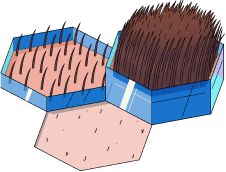Any bloke who’s looked at both his grandpa and his dad’s thinning locks has tentatively thought to himself: “What age will I start losing my hair?”
Usually closely followed by a “Is there anything I can do?”
The answer to the second question is yes, there are ways to stimulate hair growth and even prevent further hair loss. As for the first question, the answer isn't as clear-cut. Let us explain.
How common is hair loss?
Hair loss is one of the most common conditions among men the world over. More than 80% of men will experience it at some point, with nearly half of us copping it before we even make it to old age.
Androgenic alopecia, or male pattern baldness for those of you playing at home, is what happens when your hair follicles start packing it in.
Hair loss, in fact, isn’t a very accurate term for it, as everybody loses about 150 hairs a day, on average.
It’s when these hairs stop growing back like they used to that you may start to notice a receding hairline and bald patches. It's only then that hair loss occurs and becomes evident.
And it can be a hard day, too.
Whether you start to notice those few extra strands in your early 20s or are finding it’s a stark reminder of the natural ageing process in your 50s, hair loss is, at first, a hard pill to swallow.
First things first, it's very important to remember that nobody has ever died from a lack of hair.
In fact, plenty have benefited from their slick new look. The extra time from not having to do anything to it, and the extra few dollars in the pocket thanks to no longer having to fork out for shampoo, products, or trips to the barber, are all benefits.
With all this said, it’s something that the majority of us would rather not go through, given the option.
Due to the amount of misinformation surrounding the topic, as well as snake-oil miracle cures that do more to lighten a bloke’s wallet than they do to fix the expanding bald patch up top, it can be easy to get jaded, do nothing, and let time and fate do their thing.
But hair loss treatments are an option and studies show that the most common type works for more than 80% of men in retaining hair [1].
That said, it’s a decision that should be discussed with a doctor first. Although you don't need any special tests in order to diagnose male pattern baldness, a healthcare professional will have expert advice that you may not come across while doing your own research.
It’s usually genetic
While there are multiple potential causes for male pattern hair loss, the chances are that any thinning you may be experiencing up top is linked to your family tree.
And though the genetic material that causes baldness is indeed carried on the X chromosome, suggesting it does come from the mother’s side, the reality is that you were made by 2 people, and you’ll carry both of their genetic material.
This might not be the best indicator of exactly when you will start losing your hair, but it’s better than nothing.
If you look to the men in your family tree and notice that hair loss is prevalent particularly early, or particularly late in life, then there’s a good chance that you will fall into the same category (and have some idea of when it might start happening to you).
When does hair loss start?
Ok, so this is a bit of a trick question.
As loosely discussed above, hair loss is an incredibly broad term for a very personalised problem. Every man’s hair loss story is unique, and there’s no exact answer.
What is helpful is the fact that we roughly know the percentage of men who will experience hair thinning and hair loss by a certain age.
And it’s a very easy number to figure out, because the percentage is about the same as the age bracket, i.e. 20% of men start losing their hair in their 20s, 30% in their 30s and so on.
It’s why, by 80, nearly 80% of men will have lost at least some of their hair.
With this in mind, there is evidence to suggest that younger generations are losing their hair earlier than previous generations have, as suggested by a 2018 study of 4,000 Chinese men [2].
The exact reasoning for this is still unknown, as it’s early days, but the suggestions of a higher level of stress, poorer diet, and a generally more sedentary lifestyle all sound like legitimate indicators that could explain this across-the-board statistical trend.
It’s also worth noting that ethnicity, too, seems to have a small role to play in determining your odds of experiencing hair loss at different ages, with Asian heritage generally meaning you’re more likely to keep your hair longer; and African heritage even more so.
However, not enough evidence in the form of trusted, peer-reviewed scientific studies exists to support a concrete theory.
What is clear is this: it’s a somewhat reassuring thought that, no matter where you might sit on that scale, whether you’re bald by 30 or starting to thin at 60, you’re far from alone in noticing it (and deciding what to do about it).
Is there a cure for hair loss?
A cure? For hair loss? Wouldn’t that be nice.
Sadly, if a “cure” existed, then you would have already heard about it and somebody would be very, very rich indeed.
But that’s not to say that seeing those extra strands is a death sentence for your beloved ‘do, either.
Hair loss can often be stopped in its tracks, and for millions of men the world over a treatment plan is available just by talking to a doctor.
Some wish to keep their locks through this option and happily do so for many, many years to come. Others simply want to get a few extra years in their youth with a mop up top without the worry of looking older than they are due to a few failing follicles.
Another option is to get a hair transplant, although this is a pricier option.
And for many, simply trying a new hairstyle or investing in a good set of clippers is all that it takes to rock a new look with confidence and bravado that doesn’t leave you looking like Albert Einstein.
Why does age matter?
Thinning hair is thinning hair no matter what age you may be, it’s true, so it’s easy to ask why age is even relevant in determining when you'll lose hair.
But it is something most men don’t think about until after it’s started to happen, and this is important because the studies that concern effective hair loss treatment indicate that the efficacy of said treatments hinges mostly on one important factor: time.
In essence, if you’re going to take the pharmaceutical route, your chances of it working are far greater if you start early, before that bald patch has started to appear, your shower plug has started to clog up, and your hairbrush is telling you it’s time to make a decision.
Image credit: Getty Images


















.svg)




